 W
W2084: The End of the World is a 2015 novel by Algerian writer Boualem Sansal, published by Éditions Gallimard on 20 August 2015. A dystopian novel, 2084 was inspired by George Orwell's Nineteen-Eighty Four and is set in an Islamist totalitarian world in the aftermath of a nuclear holocaust. It was jointly awarded, with Les Prépondérants by Hédi Kaddour, the 2015 Grand Prix du roman de l'Académie française. It was also named the best book of the year by the magazine Lire.
 W
WAlways Hiding is a novel written by Filipino-American novelist Sophia Romero. Published by the William Morrow and Company in March/April 1998, the 272-page English-language novel's title was the translation of the Tagalog-language phrase "Tago nang tago". Abbreviated as "TNT", the phrase is a moniker for "an illegal alien in the United States" who always has to hide and be cautious in his/her movements so as not to be found and caught by immigration authorities.
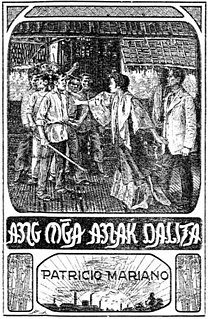 W
WAng mga Anak Dalita is a 1911 Tagalog-language novel written by Filipino novelist Patricio Mariano. The 73-page novel was published in Manila by Limbagan at Aklatan Ni I.R. Morales during the American era in Philippine history (1898–1946). Ang mga Anak Dalita is a political novel that deals also with Filipino ideology, the socio-economic situation, the industrial upheaval, and the struggle of the oppressed Filipino working class in Manila during Mariano’s time.
 W
WAng Tundo Man May Langit Din is a 1986 Tagalog-language novel written by Filipino novelist Andres Cristobal Cruz. The 324-page novel was published by the Ateneo de Manila University Press. The novel involves love and romance occurring between individuals that are residing in a poverty-stricken area in Tondo, Manila in the Philippines. The social background of the individuals produces a "dramatizing effect" in presenting the Philippine experience laid out in contemporary context and setting, giving the novel a similarity in style and theme to Philippine national hero Jose Rizal's Noli Me Tangere.
 W
WAnino ng Kahapon is a 1907 Tagalog-language novel written by Filipino novelist Francisco Laksamana. The 294-page novel was published in Manila by Santiago L. Abillar and SP during the first few years of American period in Philippine history. The 1907 version was illustrated by P Imperial. The novel was republished by the Ateneo de Manila University Press in 2002. According to the Ateneo de Manila University Press, the novel was written by Laksamana to help provide the readers with a "nostalgic recollection of the period of mournful Filipinoness". According to literary critic Epifanio San Juan, Jr. — apart from being a historical and political novel — Anino ng Kahapon was one of the romance novels and novels about heroic Philippine characters produced by Filipino authors from 1900 to contemporary times.
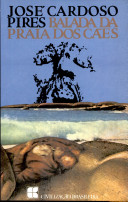 W
WBallad of Dog's Beach is a fiction novel by the Portuguese author José Cardoso Pires, relating the investigation into the murder of a political dissident, taking place around one month later by 1961. The novel is largely based on contemporary reports of a real murder that took place. The real story is the assassination in early 1961 of Army captain Almeida Santos by Jean Jacques, an Army m. d. They were both dissidents of the political regime who escaped from prison with the help of a prison guard. The three men took refuge in a house in Guincho Beach, twenty km outside Lisbon. They were joined by Maria José Maldonado Sequeira, a beautiful young woman who had an affair with A. Santos. While waiting for opportunity to leave the country, Maria José started a love affair with the two men, Santos e Jacques, which caused a fight between them and the death of Santos. Jacques buried him in the beach with the help of the guard. The body was discovered one month later by a dog whose owner was taking a walk.
 W
WBen Singkol is a 2001 novel written by Filipino National Artist F. Sionil José. It is about Benjamin "Ben" Singkol, who is described as “perhaps the most interesting character” created by the author. Based on José's novel, Singkol is a renowned novelist who wrote the book entitled "Pain", an autobiography written during the Japanese occupation of the Philippines. Through the fictional novel Singkol recalled the hardships experienced by the Filipinos during the occupation. Singkol was described to be a coward, a "supot" or an uncircumcised man who did not only run away from such a “ritual of manhood” but also evaded his “foxhole in Bataan when the Japanese soldiers were closing in”. Singkol was a “runner” or “evader” throughout much of his lifetime, while being haunted by the “poverty of his boyhood” and of the “treachery that he may have committed” in the past. In 1982, Singkol began receiving letters from a Japanese named Haruko Kitamura.
 W
WBerlin Without Jews is a 1925 dystopian novel by Arthur Landsberger. It is written from the point-of-view of two German families friendly to each other; the Oppenheims are Jewish, and the Rudenbergs are Lutherans. In the events of the book, a right-wing nationalist political party takes power and expels German Jews. The other factions of German politics and society stand by, doing nothing, thinking the Jews matter little. The expulsion has unfortunate consequences for Germany. German life is poorer both culturally and economically without the Jews, and the novel ends with the government sheepishly inviting the German Jews back and welcoming them as valued members of society.
 W
WBurger's Daughter is a political and historical novel by the South African Nobel Prize in Literature-winner Nadine Gordimer, first published in the United Kingdom in June 1979 by Jonathan Cape. The book was expected to be banned in South Africa, and a month after publication in London the import and sale of the book in South Africa was prohibited by the Publications Control Board. Three months later, the Publications Appeal Board overturned the banning and the restrictions were lifted.
 W
WCanal de la Reina is a 1972 Filipino novel written by Filipino novelist Liwayway A. Arceo. The novel exposes the social cancer in the high levels of contemporary Philippine society. The social cancer, based on the novel, is masked by the flamboyance and the pomposity of the affluent members of Filipino society.
 W
WA Case of Exploding Mangoes (2008) is a comic novel by the Pakistani writer Mohammed Hanif based on the 1988 plane crash that killed General Muhammad Zia ul-Haq, former president of Pakistan. The book received generally positive reviews from critics. It won the Commonwealth Foundation's Best First Book prize in 2009, and was shortlisted for the Guardian First Book Award.
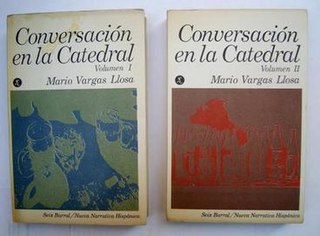 W
WConversation in The Cathedral is a 1969 novel by Spanish-Peruvian writer and essayist Mario Vargas Llosa, translated by Gregory Rabassa. One of Vargas Llosa's major works, it is a portrayal of Peru under the dictatorship of Manuel A. Odría in the 1950s, and deals with the lives of characters from different social strata. The ambitious narrative is built around the stories of Santiago Zavala and Ambrosio respectively; one the son of a minister, the other his chauffeur. A random meeting at a dog pound leads to a riveting conversation between the two at a nearby bar known as the cathedral. During the encounter Zavala tries to find the truth about his father's role in the murder of a notorious Peruvian underworld figure, shedding light on the workings of a dictatorship along the way.
 W
WThe Currency of Mount Serenity is a political economic novel by Abdullah Al-Salloum. The novel interprets – in a virtual world – the historic development eras of the real monetary system. The title was ranked as best-seller on Jamalon; middle-east's largest online books retailer.
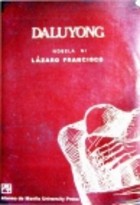 W
WDaluyong is a 1976 Tagalog-language novel written by Filipino novelist Lazaro Francisco. The novel was published in Quezon City, Manila, in the Philippines by the Ateneo de Manila University Press.
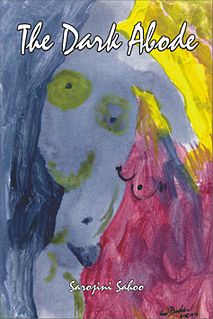 W
WThe Dark Abode is a collage presentation of South Asian feminist novelist Sarojini Sahoo's novel and American poet and painter Ed Baker's 23 sketches, which deal with terrorism that people often face from micro- to macrosphere.
 W
WDeep Rivers is the third novel by Peruvian writer José María Arguedas. It was published by Losada in Buenos Aires in 1958, received the Peruvian National Culture Award in 1959, and was a finalist in the William Faulkner Foundation Ibo-American award (1963). Since then, critical interest in the work of Arguedas has grown, and the book has been translated into several languages.
 W
WDekada '70, translated into English as "The 1970's", is a Filipino novel written by Lualhati Bautista. The book was made into a film in 2002.
 W
WDemocracy or DemoCrazy is a political satire novel wrote by Seyyed Mahdi Shojaee in Persian and translated to English by Caroline Croskery. Democracy or DemoCrazy was published by Candle and Fog Publishing in 2014. This book also published by Createspace Publishing in 2015.
 W
WThe Fatwa Girl is a 2011 novel by Pakistani author Akbar Agha. It is story of love and innocence lost in the Pakistan of today, where modernity is symbolized by the possession of a nuclear bomb, but where religious hatreds are as old as time itself.
 W
WGagamba, subtitled The Spider Man, is a novel by award-winning and most widely translated Filipino author F. Sionil José. The novel is about a Filipino male cripple nicknamed “Gagamba”, a vendor of sweepstakes tickets in Ermita, Manila. After being buried in the wreckage, the seller survives an earthquake, together with two other fortunate characters, that occurred in the Philippines in the middle of July 1990. The novel simultaneously raised a “fundamental question” about the meaning of life and offers one “rational answer”.
 W
W'GAPÔ is a 1988 Tagalog novel written by award-winning Filipino author Lualhati Bautista. Its complete title is 'GAPÔ at isang puting Pilipino, sa mundo ng mga Amerikanong kulay brown which means "'Gapô and one white Filipino, in a world of brown Americans" in translation. 'Gapô is an abbreviated form of the Philippine place name Olongapo.
 W
WIce Road is a novel written by South African-born Gillian Slovo. It was shortlisted for the Orange Prize for Fiction. Set in Leningrad in the 1930s, the story about power in Stalinist Russia is narrated by Irina Davydovna, a cleaning lady.
 W
WIf Israel Lost the War is a 1969 alternate history political novel written jointly by Robert Littell, Richard Z. Chesnoff and Edward Klein.
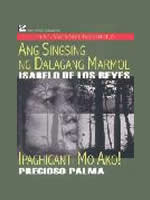 W
WIpaghiganti Mo Ako...! is a 1914 Tagalog-language novel written by Filipino novelist and dramatist Precioso Palma. The 207-page book was published in Manila by Limbagang Banahaw during the American era in Philippine history (1898-1946). The 1914 version of the novel has an afterword written by Julian C. Balmaceda.
 W
WJagari or Jagori is a Bengali novel written by Satinath Bhaduri. The novel is considered to be a master-piece of Indian literature and it was first published in 1945. It is a semi-autobiographical novel and it is set the 1940s's during the Quit India Movement.
 W
WJuan Masili: Ang Pinuno ng Tulisan is a 1906 Tagalog-language novel written by Filipino novelist Patricio Mariano. Based on Project Gutenberg, the original format of the title of the novel was rendered as Juan Masili o Ang Pinuno ng Tulisan meaning "Juan Masili or The Leader of Bandits", therefore the title could stand alone either as Juan Masili or as Ang Pinuno ng Tulisan. The 24-page short novel was published in Manila, Philippines by Libreria Luzonica during the American era in Philippine history.
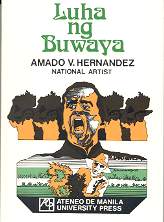 W
WLuha ng Buwaya or, "Crocodile's Tear" in translation, is a novel written by Palanca Awardee and Filipino novelist Amado V. Hernandez. It consists of 53 chapters. The story is about poor farmers uniting against the greedy desires of the prominent family of the Grandes. In Filipino idioms, "crocodiles" were used to symbolize those people who are corrupt. The "buwaya" (crocodile) in the title refers to the Grandes family, who were greedy for money.
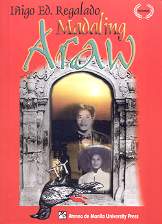 W
WMadaling Araw ("Dawn") is a 1909 Tagalog-language novel written by Filipino novelist Iñigo Ed. Regalado. The 368-page novel was published in Manila, Philippines by the Aklatang J. Martinez during the American period in Philippine history (1899-1946). Madaling Araw won for Regalado a Panitikan Series Philippine National Book Award. The novel is both a romance novel and a political novel.
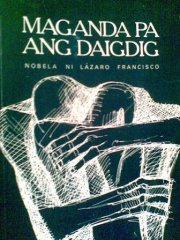 W
WMaganda pa ang Daigdig is a Tagalog-language novel written by Filipino novelist Lázaro Francisco.
 W
WMasha, or the Fourth Reich is a dystopian novel by Lithuanian/Ukrainian author Jaroslav Melnik. Published in 2013 in Lithuanian by the largest publishing house company group in the Baltic states Alma littera, it was shortlisted for the Book of the Year Awards. 18 reviews have been published about this novel. Critics call this thriller ‘a shocking book that can be a bestseller in Western countries’. ‘In this book the author fulfilled Hitler's dream’. In 2016 the novel was published in Ukraine and became a bestseller. In 2020, the novel was published in France by Actes Sud.
 W
WMass, also known as Mass: A Novel, is a 1973 historical and political novel written by Filipino National Artist F. Sionil José. Together with The Pretenders, the Mass is the completion of José’s The Rosales Saga, which is also known as the Rosales Novels. The literary message of Mass was "a society intent only on calculating a man's price is one that ultimately devalues all men".
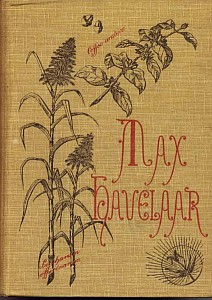 W
WMax Havelaar; or, The Coffee Auctions of the Dutch Trading Company is an 1860 novel by Multatuli, which played a key role in shaping and modifying Dutch colonial policy in the Dutch East Indies in the nineteenth and early twentieth century. In the novel, the protagonist, Max Havelaar, tries to battle against a corrupt government system in Java, which was then a Dutch colony. The novel's opening line is famous: "Ik ben makelaar in koffie, en woon op de Lauriergracht, Nº 37.".
 W
WMga Anak-Bukid is a 1911 Tagalog-language novel written by Filipino novelist Rosauro C. Almario. Published by the Limbagang Cultura Filipina in Manila, Philippines, the novel narrates how the Filipinos who became the so-called pensionados undermined the traditional values and mores in the Philippines, including the people who acted as supporters and upholders of those conventional customs and norms.
 W
WSamuel Warren, was a British barrister, novelist and MP.
 W
WPharaoh is the fourth and last major novel by the Polish writer Bolesław Prus (1847–1912). Composed over a year's time in 1894–95, serialized in 1895–96, and published in book form in 1897, it was the sole historical novel by an author who had earlier disapproved of historical novels on the ground that they inevitably distort history.
 W
WPinaglahuan is a Tagalog-language novel written by Filipino novelist Faustino S. Aguilar. Aguilar completed the manuscript on September 25, 1906. The novel was published by Manila Filateco in Manila, Philippines in 1907. The novel was written during the American period in Philippine history (1898-1946).
 W
WThe Porcupine is a short novel by Julian Barnes originally published in 1992. Before its British release date the book was first published earlier that year in Bulgarian, with the title Бодливо свинче by Obsidian of Sofia.
 W
WThe President Is Missing is a political thriller novel by former U.S. President Bill Clinton and novelist James Patterson published in June 2018. It is Clinton's first novel. Clinton and Patterson also teamed up to write a standalone novel with all new characters, The President's Daughter, released in June 2021.
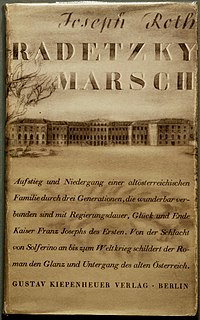 W
WRadetzky March is a 1932 family saga novel by Joseph Roth chronicling the decline and fall of Austria-Hungary via the story of the Trotta family. Radetzkymarsch is an early example of a story that features the recurring participation of a historical figure, in this case the Emperor Franz Joseph I of Austria (1830–1916). Roth continues his account of the Trotta family to the time of the Anschluss in his The Emperor's Tomb. The novel was published in English translation in 1933, and in a new, more literal, translation in 1995.
 W
WRed Dust is a 2000 novel written by South African-born Gillian Slovo that is structured around the hearings of the Truth and Reconciliation Commission (TRC) in the fictional town Smitsrivier and also addresses the question of truth.
 W
WThe Rosales Saga, also known as the Rosales Novels, is a series of five historical and political novels written by Filipino National Artist F. Sionil José. Chronologically, it is composed of five interconnected novels, namely Po-on, Tree, My Brother, My Executioner, The Pretenders, and Mass. The Rosales Saga traced the five generations of two families, namely the Samsons and the Asperri through Spanish and American periods in the history of the Philippines until the period after Philippine Independence. José begun writing the series in 1962 and completed it in 1984.
 W
WRudin is the first novel by Ivan Turgenev, a famous Russian writer best known for his short stories and the novel Fathers and Sons. Turgenev started to work on it in 1855, and it was first published in the literary magazine "Sovremennik" in 1856; several changes were made by Turgenev in subsequent editions.
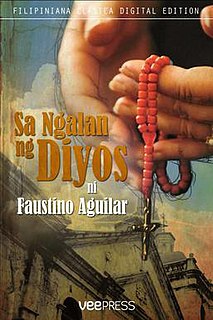 W
WSa Ngalan ng Diyos is a Tagalog-language novel written in 1911 by Filipino author Faustino Aguilar. Controversially, it illustrated how greedy Jesuit priests schemed, manipulated, and took advantage of Carmen, a young, naive, pious, and affluent heiress. The 191-page book was published in Manila by the Limbagan at Aklatan Ni I.R. Morales during the American period in Philippine history (1898–1946).
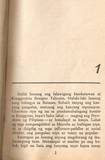 W
WSatanas sa Lupa, subtitled “nobelang pangkasalukuyan”, is a 1970 Tagalog-language novel by Filipino author and scriptwriter Celso Al. Carunungan, one of the “titans of Philippine literature”. The novel criticizes the Philippine government and society during the early part of the 1970s, a reason why the author had been included among the group known as "Class 1081", Filipinos imprisoned when Martial Law was declared by Ferdinand Marcos in 1972.
 W
WSenja di Jakarta is an Indonesian novel written by Mochtar Lubis and first published in English by Hutchinson & Co. in 1963, with a translation by Claire Holt. It was later published in Indonesian in 1970.
 W
WSherds is a 2007 short novel or novelette written by Filipino National Artist for Literature and multi-awarded author F. Sionil José. According to Elmer A. Ordoñez, a writer from The Manila Times, in Sherds José achieved “lyrical effects”, specially in the novel’s final chapters, by putting into “good use” Joseph Conrad’s and Ford Madox Ford’s so-called progression d’effet. Sherds is the latest and last novel by José. According to The Atlantic National Correspondent James Fallows, the novel is dedicated to the author’s wife Teresita José. The novel, which can be read in one sitting, was described by Li-an de la Cruz-Busto, a reporter for Sun.Star Davao as “very light but candid and insightful”, a description that complements The Manila Times reporter Perry Gil S. Mallari’s calling José’s Sherds as an “easy read and a guaranteed page-turner”. A novel composed of twelve chapters with a "tight and palpable" narrative pacing, Sherds deals with topics related to "personal conscience, greed and the position of art" in social class struggle, thus serving as a cogitation on "what is wrong" with the Philippines as a nation. José wrote Sherds while he was in Japan.
 W
WSin: A Novel, also known as Sins, is a 1973 politico-historical novel written by Filipino National Artist F. Sionil José. This particular work of literature features the History of the Philippines, for the most part spanning the twentieth century, through the eyes of the “amoral” Don Carlos Corbello, a wealthy patriarch also known by the moniker “C.C.”.
 W
WState of War, also known as State of War: A Novel, is the first novel written in 1988 by American Book Award recipient and Filipino author Ninotchka Rosca. It was described as a political novel that recreated the diverse culture of the Philippines through the presentation of an allegorical Philippine history.
 W
WThe Successor is a 2003 novel by the Albanian writer and inaugural International Man Booker Prize winner Ismail Kadare. It is the second part of a diptych of which the first part is the novella Agamemnon's Daughter. The diptych is ranked by many critics among the author's greatest works.
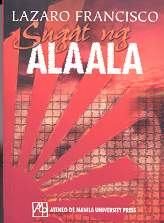 W
WSugat ng Alaala is a 1995 Tagalog-language novel written by Filipino novelist Lazaro Francisco. The 376-page novel was published in the Philippines by the Ateneo de Manila University Press.
 W
WSultan of Najd is a political economic novel by Abdullah Al-Salloum. The novel interprets –within the ancient Ukhaydhariya State– a series of events that exposed what was unknown by the throne, not only within the monetary scope, but the state politics, where the Emir gets introduced to reforming schemes meant to achieve the state’s sustainability. The title was ranked the third bestseller on Amazon's Arabic Literature and Fiction category.
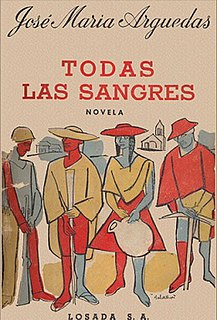 W
WEvery Blood is the fifth novel of the Peruvian writer José María Arguedas published in 1964. It is the author's longest and most ambitious novel, being an attempt to portray the whole of Peruvian life, by means of representations of geographic and social scenes of the entire country, although its focus is on the Andean sierra. The title alludes to the racial, regional and cultural diversity of the Peruvian nation. The novel revolves around two fundamental ideas: the danger of imperialist penetration into the country through large transnational companies, and the problem of modernization of the indigenous world.
 W
WTwice Blessed, also known as Twice Blessed: A Novel, is a 1992 novel written by Filipino author Ninotchka Rosca. It won the 1993 American Book Award for “excellence in literature”. It is one of Rosca’s novels that recreated the diversity of Filipino culture. Apart from tracing back Philippine History, Rosca also portrayed contemporary Philippine politics, delicate events, and cultural preferences through the novel.
 W
WVibora! is a 2007 novel written by Filipino National Artist F. Sionil José. The novel narrates the life of an accidental hero, Benjamin Singkol, during the Japanese occupation of the Philippines after escaping from Bataan during the Second World War. Singkol in turn narrates the life of Artemio "Vibora" Ricarte whose identity is being questioned: whether a patriot or a collaborator to the Japanese occupiers.
 W
WVoyeurs & Savages is a 1998 English-language novel written by Filipino novelist Alfred A. Yuson. The 220-page novel was published in Pasig in the Philippines by Anvil Publishing, Inc. The second edition of the novel was published by Anvil Publishing, Inc. in 2003. The novel is a winner of the Philippines' Centennial Literary Prize. The novel featured the events before, during, and after the St. Louis World Exposition of 1904 in the United States. During the exposition that was held at the St. Louis, Missouri, a group of ethnic minorities from the Mountain Province of the Philippines represented the Philippines. Apart from being representatives from the Philippines, the group of Filipinos was also the "tribal specimens" selected and exhibited by a group of American researchers and presenters during the exposition.
 W
WWhen Smuts Goes is a dystopian novel by Dr. Arthur Keppel-Jones. The novel is set during a future history of South Africa, following the ascension of Afrikaner nationalists and their increasingly destructive quest for total apartheid. It foreshadowed the fall of Jan Christiaan Smuts and his United Party administration, a rupture in ties with the British Commonwealth, and the declaration of a Second South African Republic. Presiding over the regime which follows is Obadja Bult, a dominion theologian influenced by the ideals of the former Ossewabrandwag. His blunt authoritarian streak gives spark to racial conflict—culminating in foreign intervention and troubled majority rule.